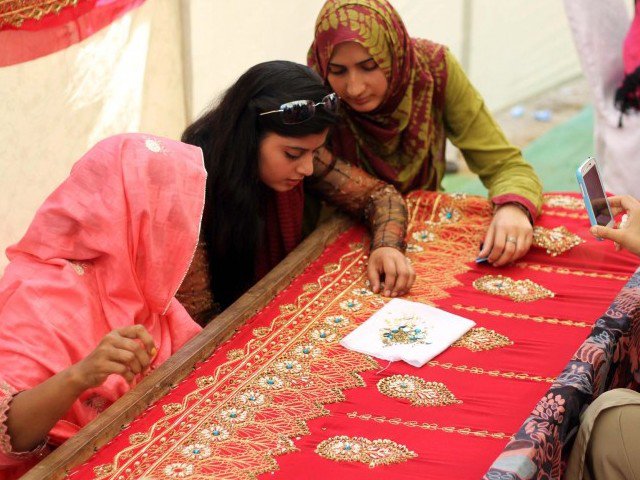
More than 15 stalls were set up at the parking area of CEWS which donned purple flags and tents to celebrate the colour of women. Women from Landhi, Korangi, Orangi and other marginalised areas, where the ratio of home-based working women is high, had set up stalls to sell their handmade items.
Nafisa Begum, 50, who has been weaving carpets since 25 years, took one month to complete a three-feet-long and five-feet-wide carpet. "The carpets I make are sold for about Rs6,500 in the market. But, since I work for a third party, I only get Rs2,400 per carpet," she lamented while weaving red wool in the khaddi she had set up at the ground.
Women decry pending policy regarding home-based workers
While printing colour on bangles, Naseem Khan who lives in Korangi, narrated how she completes printing of around 10 packets of bangles daily with a 1,000 pieces in each packet for a meager Rs250 per day.
"We are labour and our seth [owner] brings this work to us. If we demand more money, then they ask us to leave the work and we cannot afford to do so," she explains.
Khan has been putting up her stall at the institute since four years. The department pays the women who set up stalls, which are free of charge, their one-day wage in lieu of not being able to work at home on that day.
Celebrating working women: Home-based workers display handcrafts at KU event
The event was organised to celebrate International Women's Day and to spread awareness among women about their rights. While inaugurating the event, the dean of faculty of social sciences, Prof Dr Ahmed Qadri appreciated the efforts of the women's department. "This [department] has set the trend for other institutions by celebrating women's day since many years," he said.
This day is more than just a seminar, workshop and wearing of specific-coloured dresses, he said, adding that the kind of researches being conducted by the institute should be promoted and adopted.
"The day is not far when the United Nations will adopt one of the researches conducted at the institute for women's rights," said Qadri.
The dean also emphasised that more practical work for women needs to be done in Pakistan instead of drawing room politics. He extended his support to the department students and faculty in their efforts to conduct seminars and research work.
Hard at work: Home-based workers display handicrafts as KU celebrates Women’s Day
CEWS director Dr Nasreen Aslam Shah was of the view that girls need to be empowered and that everyone, from government institutes to education institutes, should join hands to empower them. "We alone cannot make the difference until everyone will agree to the criteria we work on," she said.
Talking on the issue of home-based working females, Shah pointed out that the country does not have any data of how many females work as home-based workers. "There is a dire need of a policy for [home-based working women] so that the middleman who is earning from their hard work should be eliminated and the women can earn better for their labour," she said, pointing out that other than that, domestic violence against women and child abuse are also major issues that need to be addressed.


1731570357-0/elon-musk-(1)1731570357-0-165x106.webp)
-(1)1717678110-0/Kendrick-(1)-(1)1717678110-0-165x106.webp)













COMMENTS
Comments are moderated and generally will be posted if they are on-topic and not abusive.
For more information, please see our Comments FAQ